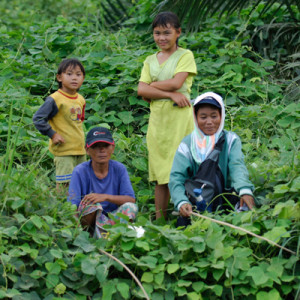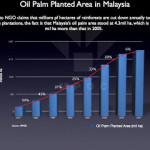Creating a fine balance for development, food security and environment sustainability.
In the ongoing sustainability debate, it is important for a developing country to ensure a fair balance between the need to develop its economy, produce sufficient food for its people and preserve the environment for sustainable development. Unfortunately, for environmental NGOs, the one-sided focus on only the environment projects an extremely unbalanced viewpoint.
Malaysia, as a developing country, has been successful in bringing about this balance by continuing to invest in the agricultural sector, in addition to developing its manufacturing, tourism, IT and services sectors. For a developing country, land is always identified as an asset that can be developed both to generate revenue and to achieve food security. If all these developments are carried out in a sustainable manner, the environmental preservation and conservation objectives are eventually fulfilled.
The contributions of palm oil and rubber to the Malaysian economy range from 5 to 8 % of the country’s GDP. These two commodities not only helped Malaysia to fight the malaise of poverty but also provide the much needed food and income for the rural communities. Globally, palm oil and rubber from Malaysia are vital commodities to meet the world’s industrial and food needs. For example, tyres for aeroplanes and large transportation vehicles have to be made with a high percentage content of natural rubber. Malaysia’s contribution is significant as it is the world’s major exporter of natural rubber. Similarly, more than 150 countries depend on palm oil from Malaysia for their supply of vegetable oils and fats for cooking, frying, making margarine and bakery fats, oleochemicals and other uses. While 55% of world oils and fats exports are accounted for by palm oil products, Malaysia alone supplies an estimated 30 %!
The major food items of the world are fats, proteins and carbohydrates. Producing palm oil (a fat) is what Malaysia does best with its agricultural land. On the other hand Malaysia has no natural advantage in producing the other two food components ie proteins and carbohydrates which the country imports using excess income from the exports of palm oil. Simple economics therefore tells us that the country achieves food securinty in fats, proteins and carbohydrates by importing the latter two using the excess income from the exports of the former.
It is crucial for a developing country to have an assurance of food security especially by employing its most important asset- agricultural land. Such an assurance makes it easier for the country to develop its other economic sectors. One often sees failures to develop a country’s economy when food insecurity prevails, and such countries often have to depend on foreign food aids.
Oil palm happens to be an efficient and high yielding agricultural oil crop. To produce the current 20 million tonnes of palm oil and palm kernel oil products, Malaysia only employs 4.5 million hectares of agricultural land or 13.6% out of the country’s total land area of 33 million hectares. If the country were to produce 20 million tonnes of soyabean oil instead, assuming international yield capability of 0.4 tonnes per hectare, Malaysia would need 50 million hectares of land, which it obviously does not have.
Palm oil is now seen as the key to the successful formula used by Malaysia, as a developing country, to achieve a fine balance between bringing continuous development, achieving food security, and preserving the forests and the environment. A significant 60% of the total land area is still intact under permanent forest, most of which is subjected to sustainable forest management under the ITTO protocol.
A lack of appreciation of these achievements has led to unwarranted calls by certain environmental NGOs for a moratorium on deforestation based on their simplistic accusation that oil palm cultivation is associated with deforestation. If forest lands are already safeguarded by the existing laws of the country and are further subjected under international protocol to be sustainably managed, calling for moratorium on deforestation does not make sense and will be considered redundant.
Furthermore, it is also unethical , immoral and somewhat patronising for NGOs of the developed countries in Europe to ask developing countries such as Malaysia to stop developing its land. This will lead to conflicts and misunderstanding because some states in Malaysia have not yet had the opportunity to develop their agricultural land as they were until a few decades ago under oppressive colonial rule. Sarawak which achieved independence from the British later than Peninsular Malaysia had only developed 8% of its land for agriculture as compared to over 70%by the UK. But there are still opportunities in Sarawak and other parts of Malaysia to develop degraded logged over land for planting oil palm and rubber to increase the country’s sources of foreign exchange while avoiding deforestation of its pristine permanent forests.
It is highly likely that the government and people of Malaysia are enlightened enough themselves to be more concerned than the EU NGOs and the EU governments on the need to preserve their pristine permanent forests for the benefit of the present and future generations. I would urge NGOs to refrain from campaigning against the use of palm oil as this is unfair to our farmers who have been exporting the agricultural produce for many generations in the past. Palm oil is an agricultural commodity that has been produced on agricultural land for generations, just like the production of rapeseed and soya in the EU countries.
It is even more perplexing to hear of attempts by irresponsible EU NGOs wanting to protest against the arrival of RSPO certified palm oil into the EU. Such a negative move should be condemned as RSPO is a sincere multi-stakeholders attempt to improve and ensure the sustainable production of palm oil for the export market. The establishment of the RSPO was initiated by NGOs like the WWF and the Malaysian palm oil industry gladly took up the challenge and proved sustainability was possible in a well organised sector that has long adhered to proper rules and regulations. RSPO has just started its sustainability agenda and further improvements can be anticipated. Instead these NGOs who seem to want to remain outside the RSPO fraternity could make a more positive contribution through offering their fertile ideas to improve palm oil sustainability if they join and become members of the RSPO. The Malaysian palm oil industry was hopeful that the RSPO, however imperfect, should be the platform to nurture and promote sustainability and not be the stage where non member NGOs undermine the sterling efforts by plantation company members who have been certified as capable of producing RSPO certified palm oil. It is time for readers to write back to these irresponsible NGOs to protest against their high handed approach in denying producers and farmers from a developing country access for their products to be exported to the EU market.
I would also like to encourage ill-informed environmental scientists not to compare the biodiversity of an agricultural crop such as the oil palm with that of rain forests. The findings would not win you a Nobel price. A fair comparison should be made with soyabean, rapeseed, corn or sugarcane or other agricultural crops. Biodiversity that exists in the oil palm plantations is a bonus for all to benefit, while we continue to enjoy a consistent supply of oil for our daily food needs, in addition to palm oil- an agricultural commodity – helping to promote economic growth not only in the developing countries but also in all other countries involved in using the product.










Another great benefit is that animals such as orangutan who happily eat, and may actually prefer, oil palm to forest fruit (because it is lower in cholesterol?), also get a nice shiny coat from eating the oil palm!
amazing!